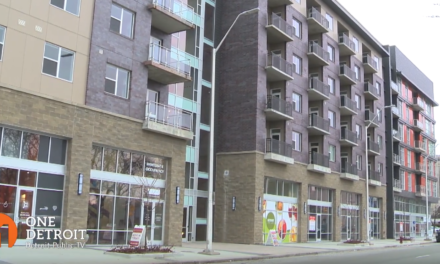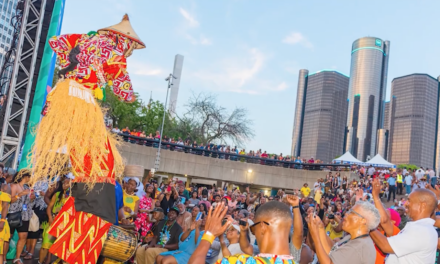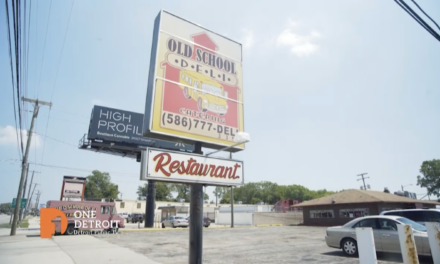American Black Journal Host Stephen Henderson catches up with the Detroit Book City bookstore to learn about its upcoming African American Family Book Expo and its initiative to further literacy in communities of color. Stephen speaks to the event organizer, Janeice Haynes, the president and CEO of Detroit Book City, as well as the featured guest author Dr. Lathardus Goggins II about being able to promote the joy of reading to Black families in Southeast Michigan.
Full Transcript:
Stephen Henderson: So, Janeice, I can’t remember which annual expo I talked to you before about, but it’s been a while so, catch us up on the expo, how it’s going, how it’s been and how it’s grown. This is the sixth annual.=
Janeice Haynes, President & CEO, Detroit Book City: This is the sixth annual and the last time we spoke was February the 16th, 2018 is when we came on your show. So we featured the second annual. This so exciting. We’re so excited to be back. I tell you this pandemic, it really through us for a loop, you know. Back then, you know, I think we had just opened up the bookstore on Greenfield Road and we were operating successfully, we’re inside the school systems. We were getting corporate orders for bulk book orders.
Janeice Haynes: And then of course, here comes the pandemic, which put us down for about a year and a half. We closed April 2020 and we just reopened, thankfully. January 8th, and now we’re in Lathrup village on Southfield Road. So we’re still alive. This is our fifth year. We’re really excited. We’re excited about the African-American. You know, that’s our biggest event.
Janeice Haynes: I think our first event, we drew out like 2,500 people.
Stephen Henderson: Wow.
Janeice Haynes: So, you know, this is exciting to be back. That’s all I can say, we’re excited. Of course, the scale of the event is much smaller because of the pandemic, but we have to practice safety measures. But we are back and we are back and alive with books preserving literacy in the Detroit community.
Stephen Henderson: So, so I want to give you just a little bit of time to talk about books. I mean, I’m a great lover of words and ideas and books and magazines and newspapers, and a lot of people who say, we don’t need those things in the same way we used to and that we don’t need bookstores in the same way they used to. So. So talk about what the what the real role is of bookstores right now in the middle, of not just of this pandemic, but of this real transition in technology.
Janeice Haynes: Well, you know, books are here to stay. It’s fundamental reading is a superpower. You know, the African-American community needs to have more access to our books and it needs to be in the community. It’s, once you reading how important is reading. You know, it helps you function as an adult. It helps you function as a child. And the bookstores, it’s an essential part of it.
Janeice Haynes: I mean, African-Americans can’t read if we don’t have access to our books. So the independent bookstores are super important. Look at the initiative they have going on now. Shop small, shop, local, shop in the bookstores. I mean, we even have the American Booksellers Association that’s that came after black bookstores now.
Janeice Haynes: They know how important it is. You know, it’s a social change going on right now. When is the best time to read? Right now. They say, if you want to find out some true information, some facts, statistics, you’ll find it in a book. The physical book is not going anywhere. It’s here. And thanks to the millennials.
Stephen Henderson: Yeah, and of course, of course, reading for joy. You know, that’s the one thing that I’ve always reveled in is that books and other publications can take you to places you’ve never been. They can play on ideas that you never had, and they can thrill you in a way that that almost no other medium can.
Janeice Haynes: Absolutely. And it’s like a comfort zone. It’s the it’s the smell, it’s the feel. It’s like once you get immersed in a book, there’s no distraction. You can actually shut the door, cut the phone off, turn the laptop down, and you can have an intimate moment with a book and really enjoy it. I mean, today you have adults that read children’s books, you know, because they like to picture. Picture books tell stories.
Janeice Haynes: I mean, not even that, you know, older people are still reading. We have senior citizens that come at our store to get books. They like poetry, you know, poetry is a way of of life, you know, it’s your soul, it’s your spirit. So, you know, tapping into a book it enlightens your whole mindset. It takes you to a whole other level, like you said joy, joy. The joy of reading. That’s our tagline, the tagline at Detroit Book City. The joy of reading for the entire family. So there’s a lot of joy in books.
Stephen Henderson: Yeah, yeah. So Lathardus Goggins the second you are coming to the middle of all of this celebration of books and you’ll be the featured author. Tell us a little more about yourself and about your connection to this festival.
Dr. Lathardus Goggins II, Author & Educator, Owner, Saint Rest Publications: Well, I’m I am a longtime lover of scholarship and the independent Black Bookstore. I’m out of Akron, Ohio. It has been the university. It has been the the public library. It has been the place of debate of intellectualism. It has been a place where you learn that there is a whole world of information out there that is specific to us about us, for us, that begins to challenge why haven’t I learned this in the school? Why I didn’t learn this in other places?
Dr. Lathardus Goggins II: Why when I go to a big box bookstore, they had that little section over there. But the intellectuals, the great giants are not there. So I’m so excited to be a part of this of thisfestival and this book expo. I’ve heard about it over the years, even out here in Akron, Ohio, and was excited to be a part of it and and to be featured as an author. And so I’m excited about that.
Dr. Lathardus Goggins II: My books are centered around African centered rights of passage and what’s important for me is the is working with young people in particular, but families in general about how to facilitate the authentic self. Right? This, how do we pass on the wisdom from one generation to the next and do so in a way that helps facilitate the authentic self.
Dr. Lathardus Goggins II: There’s also what I’ve shown in my research and some other things great impact on academic achievement, on resiliency and even when our children and as we all have done. I know I did, I did myself mess up. But when you have that, that strong measure of self, you know that you’re messing up. And it calls you back to your purpose. And so those are the kinds of things that I talk about and write about.
Dr. Lathardus Goggins II: And then just as we starting Black History Month, I’m looking over my shoulder here. 365 black nuggets of wisdom for each day of the year, I have a book that gives you a nugget of wisdom, a saying, a quote, one for each day of the year. Even though it’s Black History Month, we know we concentrate, but black history is something that we and black thought and intellectualism is something that we celebrate year round.
Stephen Henderson: Yeah, yeah. So Lathardus I’m curious what drew you to authorship and writing and the celebration of words and ideas?
Dr. Lathardus Goggins II: It really was a journey. My father is a was a intellect. He’s passed now, but he had three terminal degrees. My mother had a terminal degree. My grandfather was the superintendent back in Louisiana, and I swore up and down I would never go into education.
Dr. Lathardus Goggins II: And just through a series of events and also being formally introduced to rights of passage, I was able to look back and see how the things that my family had done for me, my ninth birthday was a was a trip across the continent of Africa and in all the kind of rituals and things that were going on that saved me and prepared me in ways that I did not recognize until I had this information to look back on.
Dr. Lathardus Goggins II: And so having done that, I was just compelled to write. And so my first book, African Centered Rights of Passage in Education, came out of my master’s thesis because when I swore up and down I wasn’t going into education, I was enrolled in an MBA program. But when I came to the realization, I switched to education and my master’s thesis was looking at the rights of past this process and its connection to education as a concept. And nothing has been done like that before. So that’s what I did.
Dr. Lathardus Goggins II: And that what really got me moving in this direction. The scholarship and the commitment and the conviction that I had to get this information out and to honor the scholars that came before me and make these connections between big concepts.
Dr. Lathardus Goggins II: A lot of people were addressing at risk youth and looking at us through a deficiency analysis and what was what became clear, is that the strength in the resiliency that is inherent in our community was always there has always been there. Had to be uplifted and brought back into our consciousness.
Stephen Henderson: Yeah.
Dr. Lathardus Goggins II: So those are the kind of things that motivated me to get me into this.
Stephen Henderson: I mean, you’re perfect, you’re a perfect featured author.
Janeice Haynes: …… [Laughter]
Stephen Henderson: Well, Janeice again. Congratulations on—
Janeice Haynes: Thank you. We’re excited.
Stephen Henderson: And Lathardus we really look forward to you being here with us in Detroit.
Dr. Lathardus Goggins II: I appreciate it. I look forward to making the trip. I’m glad and very appreciative.
Stephen Henderson: Okay, thanks for being here.
Janeice Haynes: Thank you.
Dr. Lathardus Goggins II: Thank you.
Subscribe to Detroit Public Television’s YouTube Channel & Don’t miss American Black Journal on Tuesday at 7:30 p.m and Sunday at 9:30 a.m. on Detroit Public TV, WTVS-Channel 56.
Catch the daily conversations on our website, Facebook, Twitter and Instagram @amblackjournal.
View Past Episodes >
Watch American Black Journal on Tuesday at 7:30 p.m. and Sunday at 9:30 a.m. on Detroit Public TV, WTVS-Channel 56.




